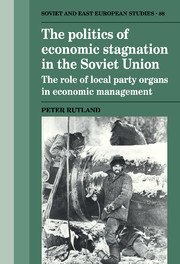 The Politics of Economic Stagnation in the Soviet Union
The Politics of Economic Stagnation in the Soviet Union Book contents
- Frontmatter
- Contents
- List of tables
- Preface
- Glossary of Russian terms and abbreviation
- Introduction: The party in the post-totalitarian system
- 1 The party and the economy: structures and principles
- 2 Party interventions in industry
- 3 Interventions in industry: case studies
- 4 The party as regional coordinator
- 5 Regional coordination: case studies
- 6 The party as fireman: party interventions in the transport and energy sectors
- 7 The role of the party in agriculture
- 8 Non-party control organs
- 9 The principles underlying the party's work with cadres
- 10 The obkom elite in the 1980s
- 11 Party and economy under perestroika
- Conclusion Party and economy in the USSR: from stagnation to collapse
- Appendices
- Notes
- Bibliography
- Index
- THE POLITICS OF ECONOMIC STAGNATION IN THE SOVIET UNION
4 - The party as regional coordinator
Published online by Cambridge University Press: 06 July 2010
- Frontmatter
- Contents
- List of tables
- Preface
- Glossary of Russian terms and abbreviation
- Introduction: The party in the post-totalitarian system
- 1 The party and the economy: structures and principles
- 2 Party interventions in industry
- 3 Interventions in industry: case studies
- 4 The party as regional coordinator
- 5 Regional coordination: case studies
- 6 The party as fireman: party interventions in the transport and energy sectors
- 7 The role of the party in agriculture
- 8 Non-party control organs
- 9 The principles underlying the party's work with cadres
- 10 The obkom elite in the 1980s
- 11 Party and economy under perestroika
- Conclusion Party and economy in the USSR: from stagnation to collapse
- Appendices
- Notes
- Bibliography
- Index
- THE POLITICS OF ECONOMIC STAGNATION IN THE SOVIET UNION
Summary
The idea of the party as regional coordinator was central to J. Hough's model of party officials as regional ‘prefects’. This chapter discusses the awkward relationship between the vertical chain of command (the ministries) and the weak horizontal forces which tried to coordinate economic activity on a regional basis.
The opening section looks at the clash between ‘branch’ and ‘territorial’ elements in the planning structure, and the attempts – largely unsuccessful – to create special regional coordination agencies. The chapter moves on to examine the impact of the associations reform of 1973, which tried to promote economic coordination by merging enterprises into larger firms, but which had the unfortunate effect of making territorial coordination even more difficult. The final section analyses the role of local Soviets, which had primary responsibility for regional issues (housing, environmental protection, labour supply and so forth). Chapter 5 offers two case studies of industries uniquely regional in character – construction and consumer goods production.
J. Hough argued that regional coordination was ‘the responsibility by which [local party organs] make their greatest contribution to the functioning of the administrative hierarchy’. While local party officials continued to devote a great deal of time to regional coordination in the 1970s and 1980s, the limitations of their prefectorial role became more and more apparent. Regional coordination was never a major priority for Soviet planners, and relying on local party organs to pick up the pieces meant that this important systemic flaw continued to fester, and repeatedly caused problems of economic coordination.
- Type
- Chapter
- Information
- The Politics of Economic Stagnation in the Soviet UnionThe Role of Local Party Organs in Economic Management, pp. 91 - 108Publisher: Cambridge University PressPrint publication year: 1992


